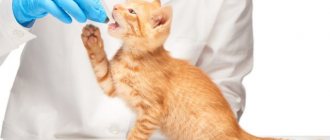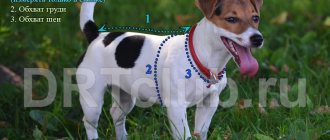The health and impeccable appearance of your beloved pet largely depends on the state of its immune system. An animal's immunity consists of cellular and humoral factors. The complex structure of the body's defenses is designed to protect the pet from pathogenic viruses, bacteria, pathogenic fungi and other microorganisms.
Immune function depends on many external and internal factors. If the body's defenses are weakened, the owner must come to the aid of his furry friend.
Causes of decreased immunity
Veterinarians and experienced dog breeders note the following reasons leading to decreased immunity in four-legged pets.
| Causes of decreased immunity in dogs | Rationale |
| Unbalanced diet | An inadequate diet, poor in protein components and vital amino acids, leads to a decrease in the production of immunoglobulins in the body of dogs. Deficiency of vitamins A, group B, ascorbic acid, vitamin D, and nicotinic acid in food products causes a decrease in the activity of cellular protective factors. A lack of minerals in the diet - calcium, magnesium, selenium, copper, iron - leads to a disruption in the production of antibodies. |
| Physical inactivity or excessive exercise | Lack of exercise, short walks in the fresh air, and little physical activity of the animal leads to oxygen starvation in the tissues, which is accompanied by low production of cellular protective factors. Physical overload provokes fatigue in the dog, which results in a malfunction of the immune system. |
| Worm infestations | Helminth infections have a significant impact on the pet’s immunity. Parasites not only consume nutrients supplied with food, but also poison the dog’s body with toxic waste products. Helminthic infestations lead to the fact that the humoral mechanisms of immunity respond to the introduction of the vaccine with a weak production of the necessary antibodies. In this regard, veterinary experts strongly recommend that owners deworm their dogs before the next preventive vaccination. |
| External parasites | Infecting a pet with fleas and lice-eaters undermines the protective functions of the skin, opening the way for pathogens. The dog's immune system is especially affected by demodicosis and otodectosis. |
| Infectious diseases | Having thrown all its efforts into the fight against pathogenic viruses and bacteria, the pet’s body has few effective mechanisms to combat fungi, rickettsia and other pathogenic agents. |
| Exacerbation of chronic diseases of internal organs | Gastritis, hepatitis, colitis, diseases of the urinary system lead to a weakening of the defenses of the four-legged friend’s body. |
| Long-term use of antibacterial agents and glucocorticoids | Accompanied by a violation of cellular immunity due to the development of dysbacteriosis and destructive processes in the liver. |
| Pregnancy and childbirth | The physiological state of the female is associated with a high consumption of nutrients and stress for the body, which cannot but affect the state of the immune system. |
| Trauma, surgery | The pet’s defenses, aimed at the processes of regeneration of damaged tissues, cannot cope with pathogenic microorganisms from the outside. |
| Unsatisfactory conditions of detention | Smoky rooms, humidity, dampness, and cold in places where dogs are kept contribute to the suppression of the body's immune system. |
In veterinary medicine, much attention is paid to the influence of stress factors on the pet’s immunity. Moving, a change of owner, the appearance of a new family member or pet, or cruel treatment by humans is difficult for many dogs and is accompanied by a decrease in the body’s defenses against infectious agents.
We recommend reading about what vaccinations dogs should get. You will learn about the vaccination schedule for a puppy and an adult pet, vaccinations that a dog should definitely get, and a review of vaccines. And here is more information about the treatment of rhinitis in dogs.
Signs in dogs
Symptoms of low immunity in animals are not as easy to recognize as it seems at first glance. Signs of immunodeficiency are general and do not always appear in a pronounced form. In addition, similar symptoms are observed in dogs with a deficiency of amino acids, vitamins and minerals in the body.
Veterinarians recommend that owners of four-legged pets pay attention to the following clinical manifestations:
- Dull, dry, disheveled coat without shine. The skin is dry, inelastic, with signs of dehydration.
- The animal avoids active games and is sedentary. Sometimes a sluggish, apathetic state is observed. The dog avoids communication with humans and seeks solitude.
- Often the dog shows unmotivated aggression towards the owner and household members.
- Colds are becoming more frequent, regardless of the season and weather. Conjunctivitis, rhinitis, bronchitis, and cystitis most often indicate a decrease in the pet’s body’s defenses.
- Joint diseases and stiffness of movement may also indicate problems with the dog’s immunity.
- Poor appetite, perversion of taste. The animal can eat inedible objects, lick polyethylene and plastic.
Often, the owner observes similar symptoms in a dog after suffering from an infectious or severe non-contagious disease, surgery, pregnancy, childbirth and feeding puppies in females. If signs of immunodeficiency are detected, the furry pet should be shown to a veterinarian, who will rule out diseases and confirm the owner’s fears.
How to increase a dog's immunity after a bite?
Piroplasmosis – tick bite. This is a severe disease that is difficult for an animal to tolerate, as hemoglobin decreases, poor blood counts are observed, the functioning of the nervous system is affected, and all organs suffer. A tick bite can cause seizures or paralysis of the limbs. You need to know how a dog’s immunity is strengthened after a bite so that it recovers faster.
While the dog is undergoing a treatment and rehabilitation period after a tick bite, you should not physically stress it; short walks in the fresh air are enough.
Drugs should be added to the food to relieve intoxication. Veterinarians prescribe:
- B vitamins, saline solutions, drugs that normalize heart function;
- for recovery, it is recommended to give folic acid, “Gamavit”;
- to improve liver function - “Essentiale Forte”;
- for normal production of red blood cells - “Fenuls”, etc.;
- To strengthen the immune system, use Vetom.
Feeding a dog after a bite
After suffering illnesses caused by a tick bite, the body weakens and therefore needs proper nutrition. You need to get advice from a veterinarian on how to feed your dog correctly so that it can quickly undergo the process of regenerating the functions of its internal organs. Let's consider the recommendations:
- You should not give raw meat to a weakened pet; it may contain additional infections, and this is detrimental to an unhealthy dog;
- The diet should consist of foods such as lean beef, turkey, stewed vegetables, cereals, eggs, boiled fish;
- It is forbidden to give foods that cause bloating, for example, cabbage, flour, sweets;
- If the animal's internal organs have been damaged, it is necessary to purchase ready-made food. If it is dry, then you need to slightly soak it so that the food is easier and faster to digest.
General recommendations on how to boost an animal’s immunity
The owner can strengthen the dog’s body’s defenses by following the following recommendations from veterinary specialists:
- A complete diet, quality feeding. When using ready-made feed mixtures, preference should be given only to high-quality premium and super-premium food. Specialized mixtures are enriched with vitamins and minerals and contain complete proteins necessary for the body. Such food is developed taking into account the physiological needs of dogs of certain breeds, age, and weight.
With a natural type of nutrition, the owner must pay attention to balancing the diet with protein. The main components in the dog's menu should be lean beef, chicken, turkey, and lean fish. Cottage cheese is a source of protein and minerals. Fermented milk products will help support the intestinal immune system.
Vegetables (carrots, pumpkin, broccoli, turnips, etc.) are a source of vitamins and fiber necessary for the body. A veterinarian will help you create a complete diet for your dog.
- Control of external parasites . In order to prevent infection with ectoparasites, the animal should purchase a special anti-parasitic collar or use special drops on the withers. The owner must comply with processing times and carry out the next procedure on time.
- Deworming an animal once every 3 months will prevent infection with worms. For processing, high-quality broad-spectrum preparations should be used.
- The use of probiotic agents after a course of antibacterial therapy will return the cellular defense of the intestine to normal. For this purpose, veterinarians advise the use of drugs such as Bioprotectin, Bifitrilak, Lactobifadol, Zoonorm, etc.
- Fighting physical inactivity. Active games with your pet, training, and various exercises help keep the dog in good physical shape. Walks in the fresh air should last at least 2 hours a day.
- Hardening. Gradually accustoming your pet to long walks and swimming in open water has a beneficial effect on strengthening the dog’s immune system.
- Maintaining hygiene rules. Regular grooming (combing, washing), hygiene of the dog’s eyes, nasal and oral cavity is the key to strengthening the body’s local defenses.
- Optimization of conditions of detention . The dog should be provided with a spacious, bright, warm room without drafts. It is prohibited to smoke in the presence of an animal, spray insecticides and household aerosol products.
An important condition for maintaining immunity at a high level is the fight against stress. An affectionate and friendly attitude towards your pet, a friendly and calm atmosphere in the house, and the absence of negative emotions help strengthen the animal’s immune defense mechanisms.
Proper nutrition
Veterinarians recommend feeding your pets finished products for a reason. A conscientious manufacturer always includes all the necessary substances and microelements in food. Some of them go towards boosting the dog’s immunity. But you need to choose the brand with extreme caution.
It is important! Almost all companies that advertise food on TV save on raw materials. They either leave out important ingredients or add artificial preservatives.
Ready-made food must be premium or super-premium class. Veterinarians often advise paying attention to brands only of European origin.
If the owner is determined to cook on his own, then he will have to stock up on a vitamin-mineral complex. Vitamins are very important for immunity, since they are the basis for the dog’s body’s defenses. In addition, the owner must competently create a menu for the pet. Porridge with meat alone is not enough, because beneficial substances are found in sea fish, vegetables, and fermented milk products. A balanced diet only helps improve immunity.
Vitamins in injections and tablets, preparations
Special medications will help effectively cope with immunodeficiency in dogs. Veterinary medicine has a wide arsenal of immunomodulators.
Modern medications activate metabolic processes in the body, increase the bactericidal properties of blood serum, and accelerate the synthesis of immunoglobulins. Immunomodulators have a detoxifying effect, increase the body's resistance to stress and physical activity, and help adapt to unfavorable environmental conditions.
The following immunostimulants are widely used in veterinary practice: Gamavit, Roncoleukin, Maksidin, Glykopin, Immunofor, Immunofan, Ribotan. Most immunomodulators are used intramuscularly or subcutaneously. The course of treatment is from 5 to 10 days. The dosage is prescribed by a veterinarian and depends on the weight of the pet.
The choice of a particular drug should be entrusted to a qualified specialist. For example, Maxidin is effective as an immunostimulant for infectious diseases, and Gamavit will be useful in cases of decreased defenses due to vitamin deficiencies, difficult childbirth, etc.
In addition to immunomodulating drugs, you can increase the body's defenses with the help of vitamins. Veterinary specialists most often recommend injections of ascorbic acid, riboflavin, and cyanocobalamin. The use of vitamin preparations in the form of tablets is also effective, for example, Excel Multi Vitamin Senior 8 in 1, Beaphar, Kanvit Junior, etc.
Vitamin-mineral complexes to strengthen the immune system should contain vitamins A, D, ascorbic and nicotinic acid, vitamin B5, as well as zinc, selenium, iodine and iron.
Watch this video about vitamins for dogs to strengthen the immune system:
Diagnostic techniques
If your dog is showing signs of fatigue, constantly looking tired and unwell, do not delay an appointment with your veterinarian. When meeting with a specialist, it is very important to remember how and after what alarming signs appeared in your pet. It is especially important for a specialist to know whether your dog has had any serious infectious disease, and whether he has a predisposition to developing allergic reactions.
To determine the type of disease, a complete and biochemical blood test and urine test are needed.
Checking the blood is especially important, since in this case the veterinarian will quickly be able to understand how many protective cells are in it, whether any of them are too young or underdeveloped, etc.
At the same time, hormone levels are checked, since a sharp change in it often indicates the presence of immunodeficiencies. Depending on the specific breed, your veterinarian may recommend genetic testing. All this is important for the diagnosis of primary immunodeficiencies.
As for the diagnosis of secondary immunodeficiency disease, the specialist will focus on identifying those diseases that, in principle, can lead to severe immune pathologies. Often, a significant improvement in the dog’s health can be achieved by stopping the manifestations of the primary disease.
Folk remedies for a weakened animal
In addition to traditional medications and biological supplements, folk remedies can help the defenses of a weakened pet. For this purpose, freshly squeezed vegetable juices (carrot, cabbage, celery juice), as well as medicinal herbs, are used. Aloe, echinacea, ginseng, and St. John's wort have immunostimulating properties.
Infusions or decoctions of herbal raw materials should be used only after consultation with a veterinarian, since many folk remedies can cause allergies in your pet. The same rule applies to beekeeping products - propolis.
We recommend reading about colds in dogs. You will learn about the symptoms of a cold in a pet, medication and traditional methods of treatment, and preventive measures. And here is more information about the treatment of pneumonia in dogs.
The immune system of the animal body is a complex structure. Its effective operation depends on nutrition, living conditions, and the presence of infectious and parasitic diseases. Having discovered symptoms of immunodeficiency in a pet, the owner should seek advice from a veterinarian.
A balanced diet and walks in the fresh air will help strengthen the defenses of your four-legged friend. An effective way to increase immunity are specialized drugs that have an immunomodulatory effect, as well as vitamin and mineral supplements.
Useful video
Watch this video about vitamins for dogs:
Similar articles
- Vitamins for dog hair: against hair loss, for skin...
Phytoelite improves immunity and has an anti-inflammatory effect. Anivital CaniDerm Tabs. ... The drug is designed for puppies and large breed dogs. Read more - Otitis in a dog (purulent, allergic, fungal...)
The risk group includes dog breeds characterized by increased thickness of hair in the ear area: lapdogs, giant schnauzers, setters. ... With a low level of immunity, the dog may experience general hyperthermia. Read more
- Pneumonia in dogs: symptoms, treatment, antibiotics...
Weakening of the body's immune system. The inability of local immunity to resist penetration into... The severity of the clinical picture largely depends on the severity of the inflammation and the state of the dog’s immune system. Read more
- What vaccinations do dogs get, do they need to be done...
The presence of helminths in the body weakens the dog’s immunity and can also lead to a distortion of the immune response to the introduction of an antigen. Read more
- Colds in dogs: can they get infected, symptoms, what...
Rainy weather, bad weather, low immunity are the main causes of illness in dogs. ... Walking in inclement weather, walking with wet hair, keeping the dog on a leash during the cold season against the backdrop of a weak immune system... Read more
What is immunodeficiency
Let us immediately note one important circumstance: unlike cats, dogs do not have a specific, separate causative agent of immunodeficiency. In general, the separate term “immunodeficiency”, when used in relation to dogs, is not very correct: this name hides dozens of other diseases that, for one reason or another, cause a decrease in the immune status of animals.
Immunodeficiency can develop (globally) in only two scenarios: either there are not enough immunoglobulins in the animal’s body, or the phagocytosis mechanism becomes ineffective.
In addition, all these pathologies can be divided into two other types, that is, primary and secondary:
- Primary immunodeficiencies are often genetically determined diseases characteristic of representatives of certain breeds or family lines. Such diseases are rare in dogs, but when they are detected, it is strongly recommended to exclude the affected individuals from the reproduction process.
- Secondary immunodeficiency diseases in dogs are the result of decreased immunity (due to a decrease in the amount of immunoglobulins or a deterioration in phagocytic activity). This may be a primary disease or occur due to an underlying health condition.
It is believed that the most typical cases involve the body’s inability to synthesize immunoglobulins (in other words, antibodies). Leukocytes are responsible for their production under normal conditions. The role of immunoglobulins is to recognize and attach to specific antigens, namely viruses and harmful bacteria.
Of course, antibodies themselves cannot do anything with the “invaders”. Their role is different - immunoglobulins are “beacons” for phagocytes. Having attached themselves to the surface of the antigen, phagocytes (special blood cells) absorb and digest it. This is one of the key features of all immunity.
In general, immunity cannot function without phagocytes. They are constantly produced by the organs of the dog’s immune system, absorbing and processing many antigens that enter the dog’s body from the external environment.
In addition, they are also responsible for transmitting information to other cells of the immune system, allowing the latter to more effectively find and neutralize pathogens.
Phagocytes are synthesized by yellow bone marrow cells and mature in the lymph nodes, from where they are released into the general bloodstream. They are usually found in the lymph nodes, spleen, brain, spinal cord, skin and in the lumen of all blood vessels.











